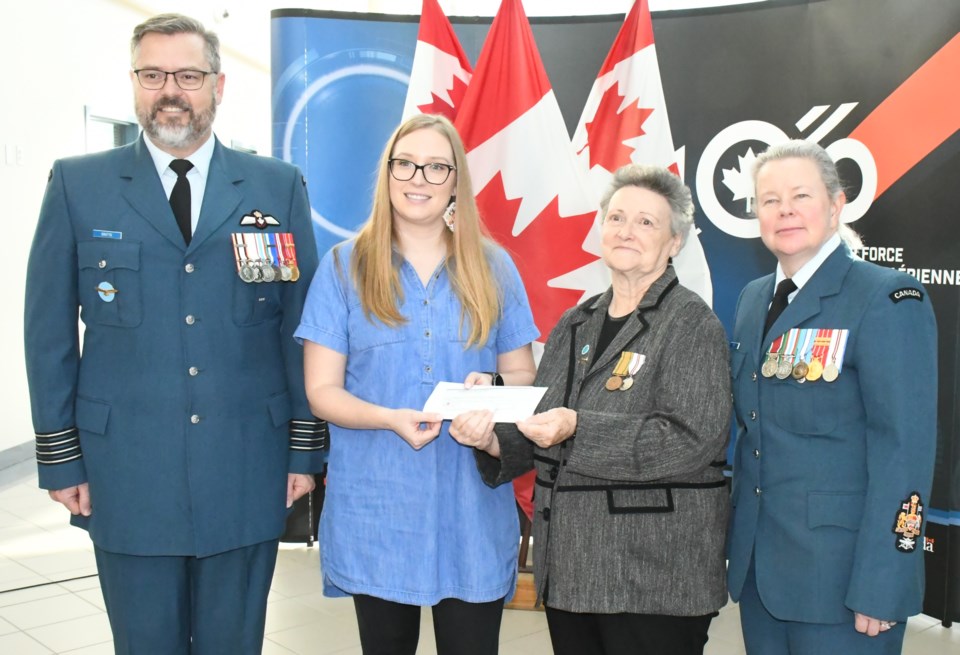The Friends of the Forces Fellowship has donated $7,500 to 15 Wing Airbase’s Military Family Resource Centre (MFRC) so it can continue to support personnel and their families.
Joyce Walter, secretary-treasurer with the Fellowship, presented a cheque to Kyla Peneycad, MFRC board secretary, at the airbase on Jan. 31 following an awards ceremony for personnel.
“We appreciate it very much. And it goes toward helping military families, and that’s a big deal for us,” said Peneycad. “We’re just really excited about it.”
The MFRC will use the cheque to support a new location called The Hive — not to be confused with the coffee shop in Moose Jaw — that helps children and “neurodivergent people,” she continued. The Hive has a social worker, Nicole Hebert, who bridges the gap for neurodivergent kids within the military community.
The organization will also use the money for other programs and initiatives, Peneycad added.
The Fellowship follows a process to issue funding to groups, so the MFRC applied and met the criteria, explained Walter. The charity’s vision is to assist military families through special projects; it doesn’t fund salaries.
During the past 10 years, Friends of the Forces Fellowship has donated more than $70,000 to the Military Family Resource Centre.
“… we’re really happy to be able to continue to support them,” Walter said, noting the van the MFRC uses was purchased with funds from the Fellowship.
The Fellowship directs some of the proceeds from its annual Highway to Heroes Car Show toward grants for the community — not just 15 Wing but also Moose Jaw, she continued. For example, the group has supported the Salvation Army, the food bank, Transition House, Make-A-Wish Saskatchewan, the health foundation and others.
Besides the car show, the organization also hosts a Musical Revue Concert, which features entertainers from Moose Jaw and the airbase, she added. This year’s event occurs on Sunday, March 24.
Supporting families and children
The Hive — similar to an early learning centre — incorporates holistic family learning opportunities, such as reviewing areas of growth for families who move often, attachment issues and healthy communications, explained Hebert.
Furthermore, it strengthens families to be allied with neurodivergent individuals and makes them more resilient so they can handle changes and have the language to accept people with differences, she continued. It also provides counselling and therapy services for neurodivergent communities.
The Hive deals with children from infants to toddlers and works with early learning programs and their parents-and-tots programs. The organization will engage in music- and attachment-related activities for co-regulation, which Hebert noted are “a lot of fun.”
“We do a lot of sensory play and early learning play in there,” she said.
The Hive’s other focus is working with families of veterans and military personnel.
Hebert described neurodiversity as the way people communicate with each other, whether that’s verbally or non-verbally, touch or non-touch and words or non-words.
The social worker has been with the MFRC for a year after coming from the Saskatchewan Health Authority. This neurodivergent project was a major focus for the organization when she joined because it wanted to expand its inclusiveness and awareness of this topic and engage people from all walks of life.
The MFRC also plans to offer a learning program to families this year that will see speakers discuss different topics around neurodiversity. These presenters will speak once a month during the program’s six-month run.
The demand for services from The Hive and MFRC is growing, and while the former is a new program, “it’s wildly needed” because military families have different requirements, said Hebert. More families are coming and going through deployment, which means they require more connection to services.
“They’re needing a safe space to explore their new environments. They might just be really needing someone to talk to just because of the heaviness of moving, (the) heaviness of even deployment, training, getting their kids into new schools … ,” she continued, adding with a laugh, “We’re pretty busy in there.”




